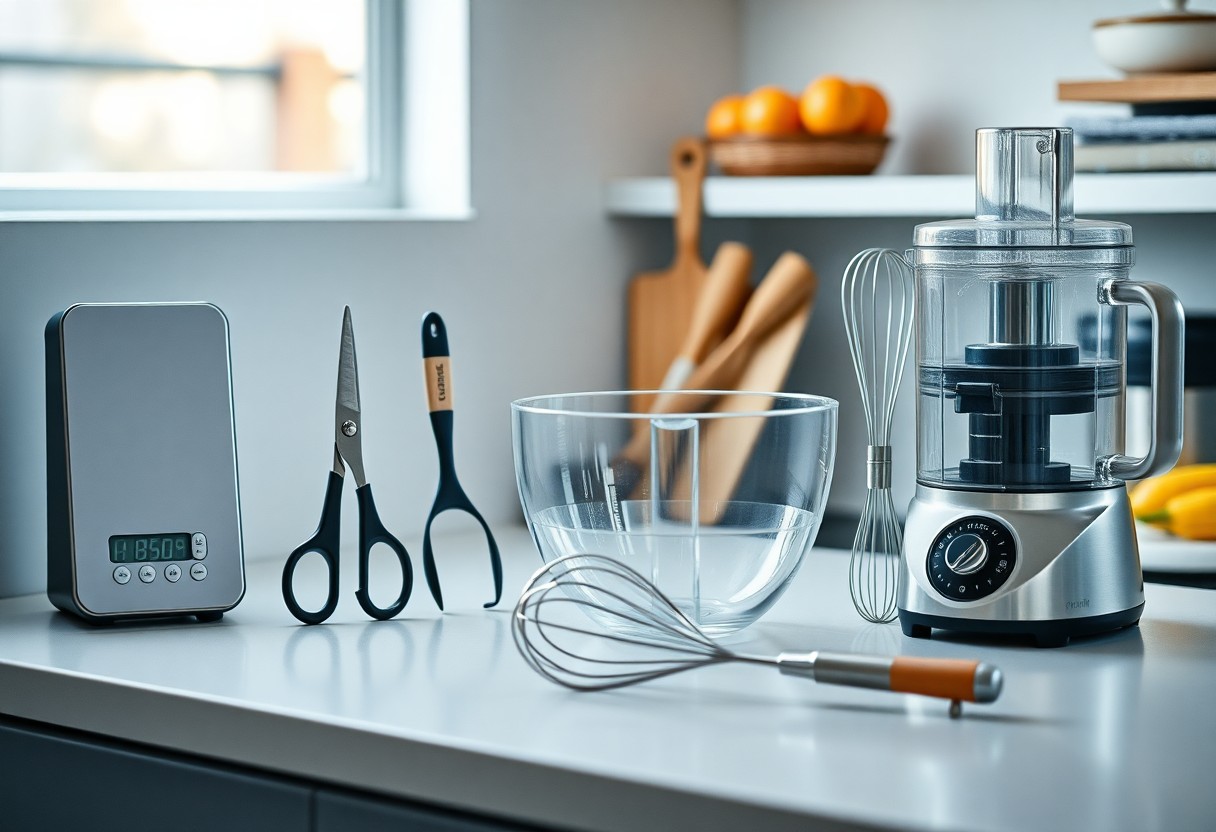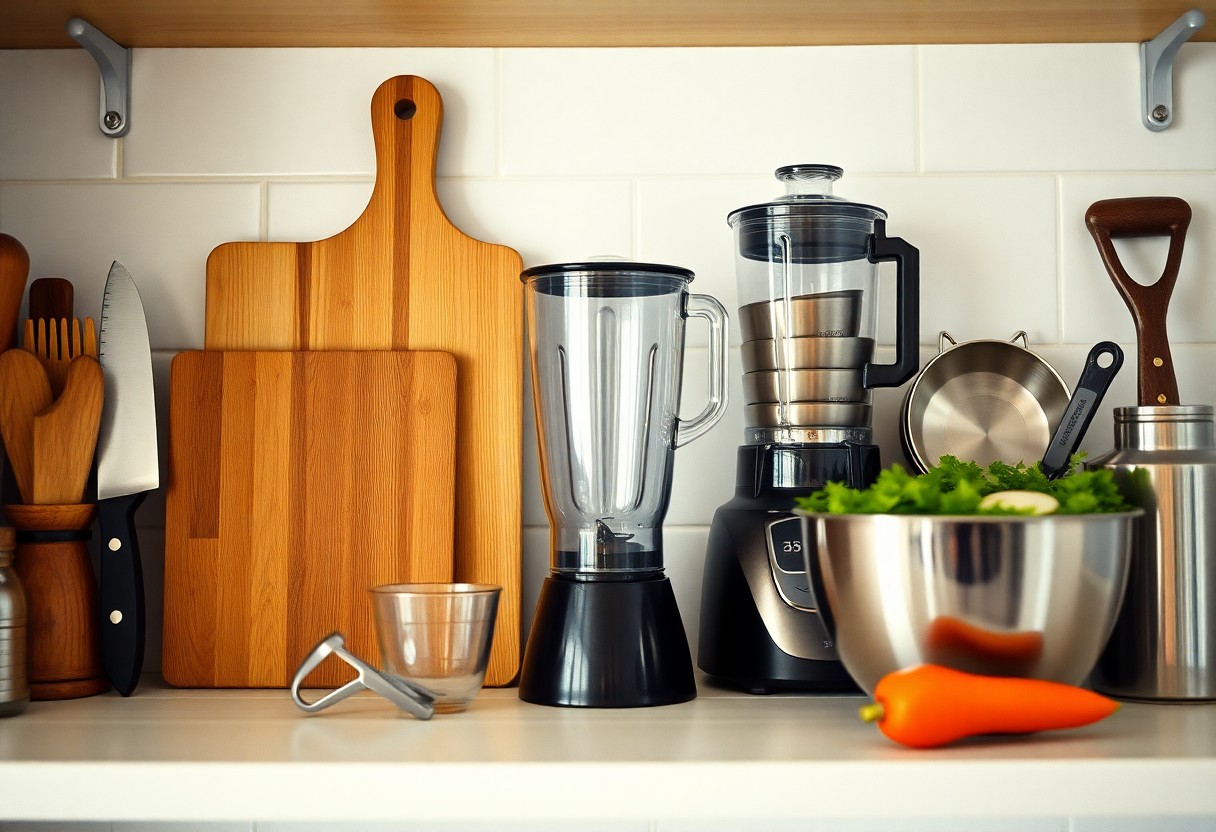You might wonder what defines an necessary kitchen tool. Understanding the expert criteria can help you identify items that enhance efficiency and safety in your cooking space. Whether it’s a chef’s knife or a quality cutting board, knowing the features that elevate their utility is key. This guide will provide insight into the characteristics that make certain tools indispensable, enabling you to invest wisely in your kitchen necessarys.

Key Takeaways:
- Versatility is key; an imperative kitchen tool can perform multiple tasks efficiently.
- Durability ensures longevity, making a tool a reliable investment over time.
- Ease of use and comfort enhance the cooking experience, promoting regular use.
Defining “Essential” Kitchen Tools
When assessing what qualifies a kitchen tool as necessary, consider its role in everyday cooking tasks. An necessary kitchen tool is one that you reach for repeatedly, providing maximum utility with minimal need for specialization. These tools streamline your cooking process, making them indispensable in your culinary arsenal.
Versatility and Functionality
An necessary kitchen tool should exhibit versatility, capable of performing multiple functions. For instance, a chef’s knife can chop, slice, and dice various ingredients, allowing it to adapt to a variety of recipes. Owning such multifunctional tools reduces clutter, optimizing your kitchen space and improving your efficiency.
Durability and Quality
Your kitchen tools must exhibit durability and quality to withstand daily use. Investing in high-quality materials such as stainless steel or hardwood ensures that your tools remain reliable over time. Cheap, flimsy alternatives often deteriorate quickly, leading to the need for frequent replacements and higher long-term costs.
Durability is measured not just by the materials used but also by the manufacturing process. Tools made from forged stainless steel, for example, often provide superior strength compared to stamped versions. Consider the longevity of a well-crafted cast iron skillet; it can last generations when properly cared for. Similarly, quality kitchen tools offer better performance, enhancing your cooking experience through improved precision and safety. Investing upfront in durable options saves you in both money and frustration over time.

Expert Criteria for Kitchen Essentials
When identifying kitchen necessarys, several expert criteria highlight their necessity in your culinary space. One of the primary factors is the tool’s ability to streamline your cooking process, ensuring efficiency and effectiveness. Besides functionality, elements such as ergonomics, material quality, and ease of storage significantly influence your selection. Each tool should not only perform well but also enhance your overall cooking experience.
User Experience and Comfort
User experience plays a vital role in determining kitchen tool necessarys. A comfortable grip, balanced weight, and intuitive design can elevate your cooking performance. Tools that fit well in your hands, enable precision, and reduce fatigue make meal preparation a joy rather than a chore, ensuring that you spend less time struggling and more time enjoying the process.
Maintenance and Care
Maintenance and care are necessary considerations when evaluating kitchen tools. Opt for tools that are easy to clean and maintain, as this promotes long-term usability. Look for materials that resist staining and degradation, like stainless steel and silicone, which require minimal effort to keep in prime condition. The less time you spend on upkeep, the more you can focus on cooking.
A seamless maintenance routine enhances the longevity of your kitchen tools. For instance, high-quality knives should be regularly sharpened and washed immediately after use to prevent rust and discoloration. Wooden utensils, meanwhile, require occasional oiling to maintain their finish. By investing just a few minutes in upkeep, you can extend the life of your necessary tools significantly, ensuring they remain reliable companions in your culinary adventures.
The Role of Personal Cooking Style
Your personal cooking style significantly influences which tools are deemed necessary. If you often prepare intricate dishes, a high-quality chef’s knife becomes indispensable. Conversely, if you enjoy simple, quick meals, basic tools like a reliable cutting board and a good peeler might suffice. Emphasizing your cooking preferences ensures that your kitchen is equipped with the tools that complement your culinary habits, enhancing both efficiency and enjoyment in food preparation.
Adaptability to Different Cuisines
Essential kitchen tools should seamlessly adapt to various cuisines. For example, a sturdy skillet can cater to both stir-frying Asian dishes and searing steaks in a classic Western style. This flexibility allows you to explore different flavors and cooking techniques without needing an arsenal of specialized tools, streamlining your culinary experience.
Alignment with Cooking Goals
Your cooking goals are paramount when evaluating necessary tools. Whether you’re aiming for healthier meals, gourmet presentations, or swift weeknight dinners, the right tools can greatly enhance your ability to achieve these objectives. A vegetable spiralizer readily supports healthy eating, while a precise digital scale ensures accuracy for baking, aligning your kitchen setup with your aspirations.
When you set clear cooking goals, each tool in your kitchen should serve a distinct purpose aligned with those aims. For instance, if your goal is to reduce prep time, a versatile food processor can chop, blend, and puree, significantly speeding up your process. Alternatively, if your focus is on mastering baking techniques, investing in high-quality measuring cups and a dependable mixer can help you achieve consistent results. Tailoring your tools to meet these specific objectives not only enhances your cooking efficiency but also contributes to a more satisfying culinary journey.
Top Essential Kitchen Tools
Incorporating the right tools into your kitchen can significantly elevate your cooking experience. Familiarize yourself with the Ultimate Guide to Essential Kitchen Equipment for Success to identify which items are indispensable for your culinary adventures.
Must-Have Utensils
Your utensil collection should include items like a sturdy slotted spoon, spatula, and whisk, all of which enhance your cooking versatility. These tools should be made from durable materials to withstand daily use and assist in various cooking methods.
Essential Appliances
Key appliances such as a reliable blender, food processor, and slow cooker transform your kitchen into a functional powerhouse. Each appliance serves specific purposes that streamline your cooking process, allowing you to focus on creativity rather than labor-intensive tasks.
For instance, a high-quality blender can not only make smoothies but also purée soups and create sauces, vastly broadening your culinary repertoire. Similarly, a food processor simplifies chopping, slicing, and kneading, saving you valuable time and effort in meal prep. Investing in these important appliances dramatically enhances the efficiency and enjoyment of your cooking endeavors.
Common Misconceptions about Kitchen Tools
There’s a prevalent belief that all high-priced kitchen tools are necessary. While some premium items offer exceptional quality, many affordable tools achieve similar results. For instance, a high-end chef’s knife may be glorious, but a well-crafted budget option can slice just as effectively. You shouldn’t equate price with necessity; awareness of your actual cooking habits is key to discerning what truly belongs in your kitchen.
Trends vs. Essentials
Kitchen trends often lead you to purchase flashy tools that promise to make life easier. However, these fads can distract you from truly necessary items that stand the test of time. For example, while specialty gadgets like avocado slicers or herb strippers may appear appealing, they rarely outperform a trusty knife or cutting board in versatility and utility.
Overrated Tools to Avoid
Some kitchen tools are marketed as must-haves, yet they rarely live up to the hype. Items like egg separators or garlic presses often clutter your kitchen without delivering significant benefits compared to basic, multifunctional tools.
Overrated tools can drain your budget and space without enhancing your cooking experience. The egg separator, for instance, only serves a single purpose and is frequently ineffective, leaving behind messes. Similarly, a garlic press may seem convenient, but a simple knife can mince garlic more precisely and without the hassle. By focusing on versatile, durable tools instead of gimmicky gadgets, you can streamline your kitchen while also saving money.
Building Your Essential Kitchen
Establishing your kitchen’s foundation begins with understanding which tools are truly irreplaceable. Implementing the criteria from The Essential Restaurant Equipment Guide can significantly streamline your selection process. Focus on quality, versatility, and ease of use to create a space that enhances your cooking endeavors.
Prioritizing Your Tool Selection
When curating your kitchen necessarys, prioritize tools that serve multiple purposes and fit comfortably within your cooking style. Items like a versatile chef’s knife and a sturdy cutting board will often take precedence over specialized gadgets. Assess what you’ll use daily versus occasionally; this analysis will guide your decisions effectively.
Budgeting and Investment Tips
Balancing quality and cost is key. Invest in a few high-quality items rather than numerous lower-quality tools, as this approach maximizes performance and durability. Allocate your budget towards items that enhance efficiency, ensuring you avoid unnecessary expenses on superfluous equipment. Always carry out research before buying; sales and discounts can significantly impact your budget.
- Quality tools pay off in the long run.
- Versatility minimizes the need for duplicates.
- Research can yield better deals.
- Budget priority is key for effective spending.
Consider setting a realistic budget by categorizing necessary tools by their importance and expected frequency of use. Start with must-haves, such as a reliable chef’s knife and cutting board, before adding specialized equipment. Investing wisely will ensure that your kitchen remains efficient and pleasurable to work in, providing lasting utility. The prioritization of quality over quantity sets a solid precedent for a well-equipped kitchen.
- Investment in quality reduces replacement costs.
- Setting priorities helps allocate your budget wisely.
- Must-haves should be top of your list.
- Efficiency is enhanced through smart selection.
Final Words
So, when assessing what makes a kitchen tool truly vital, you should consider its versatility, durability, ease of use, and maintenance. Your chosen tools should enhance your cooking experience by being reliable and efficient across various tasks, whether it’s chopping, mixing, or baking. Prioritizing quality and functionality ensures that each tool you invest in will serve you well, making your time in the kitchen more enjoyable and productive.
FAQ
Q: What characteristics define an important kitchen tool?
A: Essential kitchen tools typically possess versatility, durability, ease of use, and maintenance. They contribute significantly to daily cooking tasks and adapt to various recipes, making them indispensable for any kitchen.
Q: How does versatility influence the selection of kitchen tools?
A: Versatility is vital as it allows a single tool to perform multiple functions. For instance, a chef’s knife can be used for chopping, slicing, and dicing, making it more advantageous than a specialized tool that serves only one purpose.
Q: Why is durability important in kitchen tools?
A: Durability ensures that kitchen tools withstand regular use and last for years, reducing the need for replacements. This not only saves money but also contributes to a more sustainable kitchen by minimizing waste.
Q: What role does ease of use play in determining important tools?
A: Ease of use enhances efficiency in the kitchen. Tools that are user-friendly encourage more cooking and experimenting, making them important for both novice and experienced cooks who want to minimize frustration during food preparation.
Q: How can maintenance affect the classification of kitchen tools as important?
A: Tools that require minimal maintenance are often considered important as they save time and effort. Easy-to-clean utensils encourage regular use, allowing cooks to maintain a tidy kitchen environment while enjoying their culinary activities.
